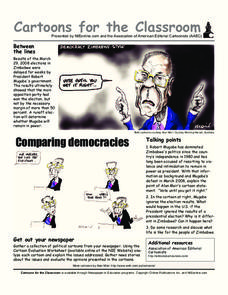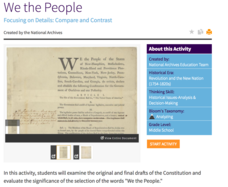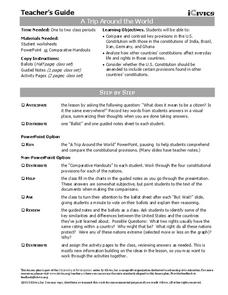Curated OER
American Government
Challenge your students with this lesson on American government! Learners discuss the three branches of government and its responsilbities, and then go on to more complex critical-thinking activities. Students interview members of the...
Curated OER
Cartoons for the Classroom: Comparing Democracies
Could a president just ignore election results? In this analysis handout, scholars consider this question as they read background information on the 2008 elections in Zimbabwe. Two political cartoons poke fun at President Robert Mugabe,...
US National Archives
We the People Focusing on Details: Compare and Contrast
Even the most inspiring documents in American history had to go through a few drafts before they were ready for publication. Reinforce the importance of the writing process, as well as the collaborative nature of democracy, with an...
Student Handouts
Comparing Countries’ Constitutions
Analyze the constitutions of five different countries and see how they relate to each country's culture and traditions. Pupils read the preambles to the constitutions of India, Ireland, Russia, Suriname, and the United States. After...
Center for History Education
Speaking Freely In the Soviet Union's Autocratic Government
Speak your mind! The lesson explores the difference in free speech between the United States and the Soviet Union. Academics review the constitutions of both governments, political cartoons, and case studies to understand how freedom of...
Council for Economic Education
The Role of Government: The Federal Government and Fiscal Policy
Give learners a crash course in balancing the books on the United States federal government level with an economics and government resource. Class members engage in a warm-up discussion and brainstorming session before answering...
Curated OER
Comparing Governments
Twelfth graders research and discuss the different elements of the governments of China, Great Britain, Mexico and the United States. They discuss the differences between the various governments and create explanation cards for each type...
iCivics
A Trip Around the World
How do the rights of citizens in other countries, such as India, Germany, Brazil, and Iran, compare to those of Americans? Take a closer look at the provisions of various foreign constitutions, and compare and contrast the protections...
Curated OER
Government Lesson Plan: Lesson Plan 12
Students investigate various political systems around the world. They complete a chart that compares the U.S. political system with other nations' governments, conduct research on a selected nation, and present an oral report.
Curated OER
Examine Your State Government's Demographics
How is your state government organized? How many elected officials are women? What is the mean age of your state representatives? Young scholars answer these questions in a research project before creating a chart to reflect their...
Curated OER
The U.S. Constitution:Continuity and Change in the Governing of the United States
Students interpret historical evidence presented in primary and secondary resources. In this U.S. Constitution lesson, students examine and analyze primary sources regarding the plan for U.S. government.
Museum of Tolerance
Citizenship Then and Now: Comparing Ancient Rome and Contemporary American Society
Class members research citizenship in Ancient Rome and in the United States and use the provided graphic organizers to compare the rights and responsibilities of citizens in these two democracies.
iCivics
Government Spending
After discussing personal financing with your class, consider following up with this well-rounded introduction to government spending. The resource includes reading documents and worksheets, and covers topics as the federal deficit and...
Curated OER
Why Do Governments Exist? Locke, Hobbes, Montesquieu, and Rousseau
Here is a great secondary source reading that includes the primary ideas and philosophies of the famed Enlightenment philosophers: Thomas Hobbes, John Locke, Charles Montesquieu, and Jean-Jacques Rousseau. In additional to discussing...
Curated OER
Who's The Boss?
Upper elementary and middle schoolers research and analyze some different types of governments. Democracies, Monarchies, and Dictatorships are some of the types that are looked at. Learners use the Internet to gather information that...
Curated OER
American Studies
Entitled American Studies, this small unit covers various topics related to the study of the United States. Learners warm up by creating a dictionary of democracy, then dive into three different lessons focused on government, famous...
DocsTeach
The School Lunch Program and the Federal Government
The school lunch program is rooted in the struggles of the Great Depression and is still assisting families today. Academics research documents and images relating to the creation of the school lunch program. Scholars use a worksheet to...
K20 LEARN
Tribal Sovereignty and the Indian Reorganization Act: Tribal Governments
Sovereign nations or wards? High schoolers investigate the history of the Indian Reorganization Act and other legislation that impacted Native Americans. They also research different tribes' constitutions, compare them to the U.S....
Curated OER
The Three Branches of Government
Students complete a unit on the three branches of government. They compare/contrast the three branches of government, write a letter or e-mail to an executive in the Federal Government, and develop outlines for historical documents.
Curated OER
What is Brazil's Government Like?
Students compare and contrast the American system of government with that of Brazil. They research how the Brazilian govenment functions.
Curated OER
The Three Branches of Government (Legislative, Executive, Judicial)
Fifth graders compare the three branches of government to a three-legged chair. For this government lesson, 5th graders discuss the Founding Fathers, the Constitution, and checks and balances. Students study what each branch of...
Curated OER
The Three Branches of Government
Sixth graders discover details about the 3 branches of government. In this primary source analysis activity, 6th graders examine documents and images from the Library of Congress to investigate the structure of the U.S. government.
Curated OER
Governance- Grade 9
Ninth graders participate in talking circles about how their classroom will function. In this self-governance lesson, 9th graders participate in talking circle activities to create rules that will govern their class. Students compare...
Curated OER
Redistricting: Drawing the Lines
Difficult redistricting concepts are covered in a context that will make it understandable to your government scholars. They begin with a KWL on the term redistricting and then watch a video to answer some questions. They analyze...

























